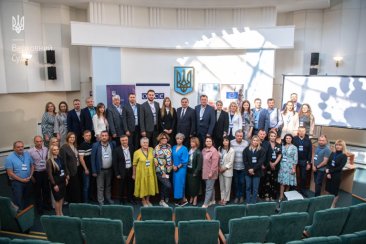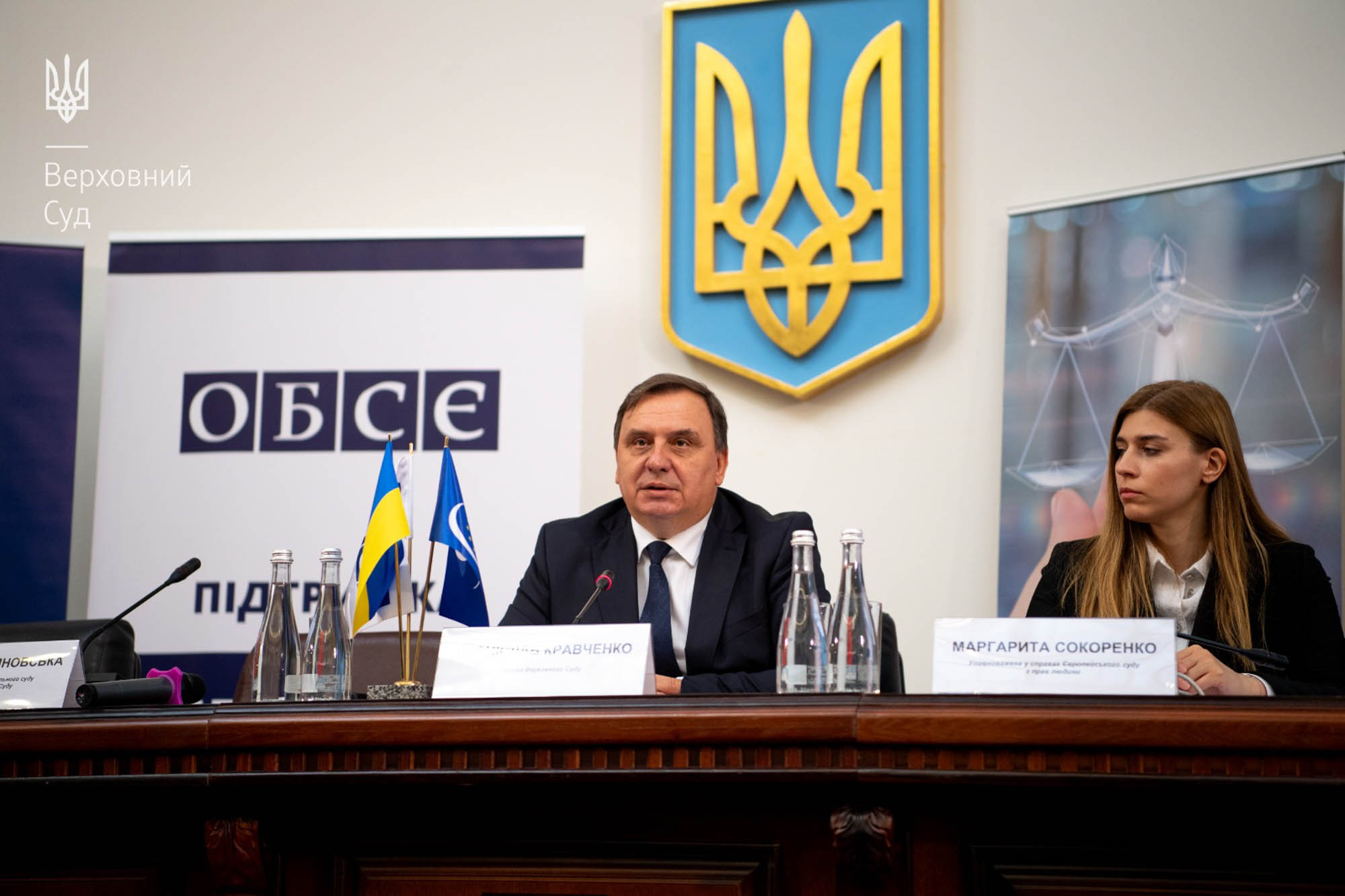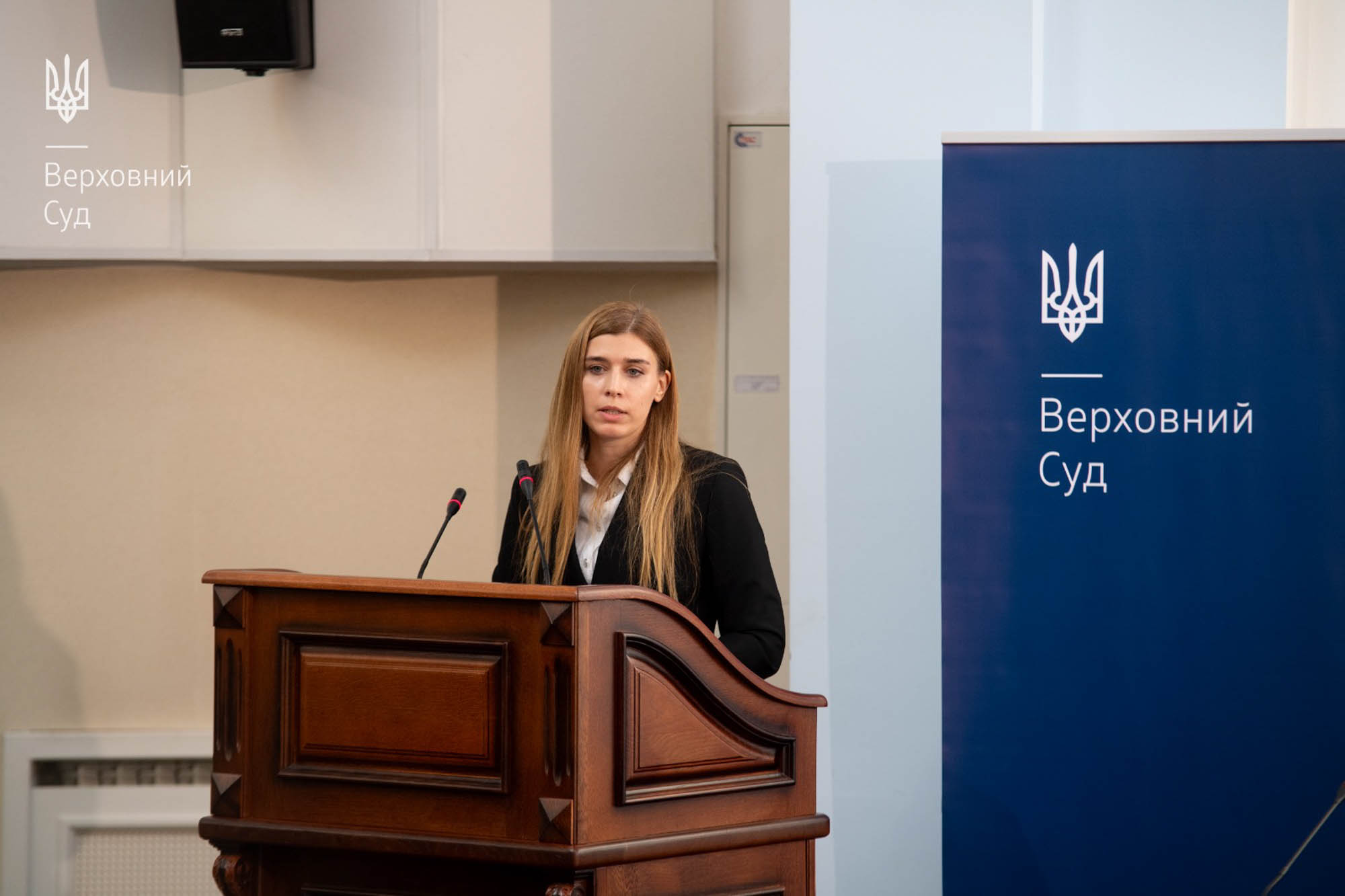Contact center of the Ukrainian Judiciary 044 207-35-46

For 27 years now, the Convention for the Protection of Human Rights and Fundamental Freedoms, and, accordingly, the judgments of the European Court of Human Rights on compliance with this Convention, have been part of Ukrainian legislation in accordance with Article 9 of the Constitution of Ukraine and the Law of Ukraine ‘On the Execution of Judgments and Application of the Case Law of the European Court of Human Rights’.
This was underlined by Stanislav Kravchenko, President of the Supreme Court, during the final roundtable aimed at discussing the current case law of the European Court of Human Rights with a view to further improving national mechanisms for the effective observance of human rights and freedoms.
As part of his report on the key issues identified by the ECHR in its judgments in cases against Ukraine, Stanislav Kravchenko noted that in 2023 the European Court of Human Rights issued 130 judgments in cases against our country. In 123 of them at least one violation of the Convention was found. At the same time, the violations found by the Court are mainly related to systemic problems, the solution of which depends on the joint efforts of all state authorities of Ukraine, including the national courts of all three instances.
Therefore, according to the President of the Supreme Court, the systematic study, understanding and further effective application of the case law of the ECHR and strict compliance with the requirements of the Convention is an extremely important component that promotes the observance of human rights in the administration of justice.

In his speech, Stanislav Kravchenko also analysed the main systemic problems identified by the ECHR in its judgments against Ukraine.
The President of the SC stressed that the war has presented our country with serious challenges, one of which is to demonstrate to the world through its actions that Ukraine remains a democratic state governed by the rule of law and the highest values of human rights. The judiciary also faces this task: the decisions of national courts must be perceived by the entire international community as fair, reasonable and in line with the decisions of the ECHR, European standards and established international practice.
Stanislav Kravchenko expressed his gratitude to the co-organisers of the event - the Council of Europe's Directorate for Co-operation Programmes within the projects "Support to the Judiciary of Ukraine in the Context of War and Post-War Period", "Fostering Human Rights in the Criminal Justice System of Ukraine" and the OSCE Support Programme for Ukraine within the project "Safeguarding Human Rights Through Courts (Phase II)".

In addition, the President of the SC recalled that the Supreme Court and the ECHR have reached an agreement on the implementation of a joint initiative - ensuring the maintenance of the ECHR Knowledge Sharing Platform in Ukrainian. This analytical resource provides users with convenient access to up-to-date information on the case law of the Court and greatly facilitates the search for relevant ECHR case law on a particular legal issue.
At the same time, the Supreme Court also pays considerable attention to the analysis of ECHR judgments and systematically prepares and disseminates relevant analytical reviews.

During the event, the Commissioner for the European Court of Human Rights, Margarita Sokorenko, also spoke about the reasons for the systematic finding of violations of Article 5 of the Convention in cases against Ukraine and the case law of the ECHR in cases of prolonged detention of applicants.
Rasim Babanly, First Deputy Chief of Staff - Head of the Department for Analytical and Legal Work of the Supreme Court, devoted his speech to an overview of the ECHR judgments in cases against Ukraine and other states in 2022-2024.
.jpg)
In addition to the positions of the ECHR, highlighted during the previous roundtables, he also cited the conclusions set out in the judgments and decisions of the ECHR in the cases of Serhiy Mykolayovych Volkov v. Ukraine, Yevdokimov v. Ukraine and Rytikov v. Ukraine.
In the case of Serhiy Mykolayovych Volkov v. Ukraine, the applicant alleged the unlawful conduct of covert investigative searches, referring to the lack of prior judicial authorisation and the subsequent use of information obtained as a result of such investigative searches to convict him.
In his capacity as a public prosecutor, the applicant initiated an investigation into criminal proceedings for embezzlement in a state-owned company. During a meeting with the general director of the company, the applicant demanded an undue advantage from him for helping him avoid criminal liability.
The general director informed the Security Service of Ukraine of this fact, and the subsequent meeting with the applicant, during which the undue advantage was to be handed over, was videotaped pursuant to part 2 of Article 8 of the Law of Ukraine "On Operational Investigative Activity", on the basis of a decision of the head of a court of appeal.
"This decision was not in the criminal proceedings files, and later, on 18 March 2022, it was destroyed along with other secret materials stored in the court archive to prevent its possible capture by the enemy. It would seem that this means the absence of the key evidence that was the basis for the covert investigative (detective) actions, while the evidence obtained as a result of these investigative actions is the main confirmation of the fact of extortion of undue advantage and its receipt. However, during the pre-trial investigation, the applicant admitted that he had accepted the money, claiming only that he had done so after the wife of the general director of the company had repeatedly insisted that he take it in order to repair the prosecutor's office. On the one hand, the plaintiff argued that the covert investigative (detective) actions had been carried out illegally, thus questioning whether the money had been transferred to him at all, and on the other hand, he admitted that he had received the money," Rasim Babanly explained.
In declaring the applicant's complaint inadmissible, the ECHR noted that, in any event, the evidence gathered as a result of the surveillance measures had only a limited impact on the applicant's conviction, given that the applicant admitted that he had received money from a person who was the subject of a criminal investigation conducted by the applicant and had used it to repay a personal debt.
.jpg)
In Yevdokimov v. Ukraine, the applicant sought a court order authorising covert surveillance measures against him. He sought to prove that the court had only authorised the tapping of his telephone, but not the recording of his personal conversations, and that such recordings were therefore inadmissible evidence because they had been obtained illegally.
"As a general rule, the order authorising the implementation of covert investigative measures should be declassified, as it is necessary to remove doubts about the defence's reasonable arguments, for example, regarding the timeframe of the relevant investigative measures or the nature of the covert investigative measures authorised by the court. In order to clarify these circumstances, the protocol on the conduct of investigative measures is not sufficient, as such information is contained in the decision of the investigating judge," the speaker noted.
The ECHR stated that the document, the disclosure of which may be required to ensure the fairness of the proceedings, includes not only evidence directly related to the facts of the case, but also other evidence that may relate to the admissibility, reliability and completeness of the former. The document requested by the applicant falls into the latter category.
In addition, the ECHR's position in this case shows that the decision authorising the covert investigation should be included in the case file and could theoretically be provided at different stages of the proceedings, if the relevant stage allows for the preparation of the defence, taking into account the arguments used by the defence to request this decision.
In the circumstances of Rytikov v. Ukraine, the pre-trial investigation authorities conducted a search of a hotel room rented by the applicant and his business partner at the time. At the end of the search, the investigator detained the applicant on suspicion of possessing and distributing pornographic material without a prior court order.
The following day, the pre-trial investigation authorities applied to the court for the applicant to be remanded in custody, but the court imposed a preventive measure of house arrest on the applicant, finding that there were insufficient grounds for his detention.
In this case, the ECHR found violations in the form of arbitrary deprivation of liberty and the absence of a redress mechanism that would allow a person to compensate for the damage caused to him as a result of arbitrary detention.
"The ECHR has repeatedly stated in its judgments that the list of grounds for compensation for such damage provided for in the Law of Ukraine "On the Procedure for Compensation for Damage Caused to a Citizen by Unlawful Actions of Bodies Conducting Operational Investigative Activities, Pre-trial Investigation Bodies, Prosecutor's Office and Court" is not exhaustive and does not meet all the requirements that should be met. In some cases, the Supreme Court applies the general provisions of the Civil Code of Ukraine - when a specific situation is not covered by the provisions of a special law, but a person has actually suffered harm within the framework of criminal proceedings," Rasim Babanly noted.
.jpg)
As part of the discussion, Oleksandra Yanovska, Judge of the Criminal Cassation Court of the Supreme Court, presented an overview of important judgments of the ECHR against Ukraine in the period 2022-2023, focusing on violations or lack of violations of Article 6 of the Convention (right to a fair trial) and Article 1 of Protocol No. 1 to the Convention (protection of property).
In her report, the judge focused primarily on the issue of ensuring compliance with Article 6 of the Convention, as it is directly related to national law enforcement.
Oleksandra Yanovska noted that when the ECHR speaks of a violation of Article 6 of the Convention, in particular a violation of the general fairness of the trial, it is obvious that the only way out is to review the case.
However, it is well known that not all court decisions are reviewed after the ECHR judgments have been handed down. This is due to the fact that violations of Article 6 of the Convention are different, and some of them can be remedied, while others cannot.
The judge highlighted these and other issues by analysing such cases as Figurka v. Ukraine, Kulish v. Ukraine, Grebenyuk v. Ukraine, Klokov v. Ukraine, Trachuk v. Ukraine, Antoniuk v. Ukraine, L.T. v. Ukraine, Bogdan v. Ukraine.
In particular, the speaker focused on the case of Budvest, TOV v. Ukraine, in which a violation of Article 6(1) of the Convention was found in connection with the failure of the applicant to notify the other party of the filing of an appeal to the Supreme Court in his case. In this case, the violation was that the legal person whose interests were affected by court decisions in criminal proceedings had not been properly informed of the filing of an appeal to the Supreme Court. In connection with this case, the speaker noted that the court cannot, of course, be responsible for the work of the postal service, but it must ensure equal conditions for the parties, i.e. it must do everything in its power and obtain proper confirmation of this.
Among other things, Oleksandra Yanovska commented on the cases in which the ECHR has also recorded violations in light of Article 1 of Protocol No. 1 to the Convention. In particular, they deal with the failure of the state to fulfil its positive obligations in terms of conducting an effective investigation in the criminal aspect.
For more details, see the publications about the previous roundtables, which are available at the following links: https://court.gov.ua/eng/supreme/pres-centr/news/1593606/; https://court.gov.ua/eng/supreme/pres-centr/news/1640994/; https://court.gov.ua/eng/supreme/pres-centr/news/1660951/)
The roundtable was organised by the Council of Europe's Directorate for Co-operation Programmes within the projects "Support to the Judiciary of Ukraine in the Context of War and Post-War Period", "Fostering Human Rights in the Criminal Justice System of Ukraine", together with the Supreme Court and the OSCE Support Programme for Ukraine within the project "Safeguarding Human Rights Through Courts (Phase II)".